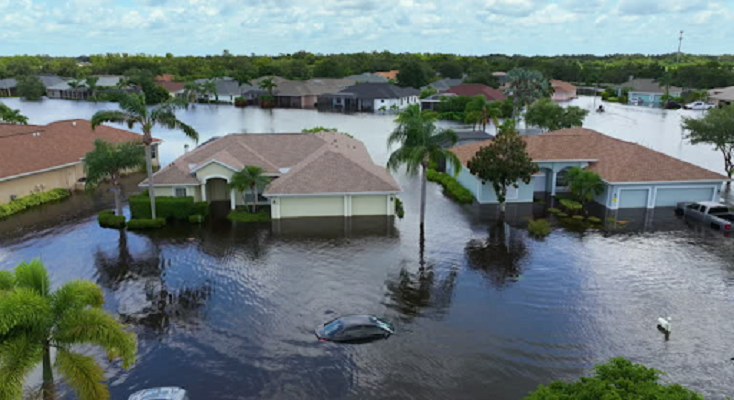Rising Tides and Smart Decisions: Why Private Flood Insurance Might Be the Key to Coastal Property Protection

There’s something undeniably magical about waking up to the sound of crashing waves, watching the sunrise over the ocean, and feeling the salty breeze drift through your window. Coastal living holds an allure that many dream of—and more people are turning that dream into reality by investing in seaside homes. But with this paradise often comes a quiet, creeping risk: flooding. Buying property near the coast isn’t just about selecting the right home or the perfect view. It’s also about managing the real dangers that come with living close to the sea. One of the most important decisions a buyer will face is how to protect that investment from flood damage. Traditionally, government-backed flood insurance has been the default choice. But over the past decade, private flood insurance companies in Florida have emerged as a compelling alternative that deserves serious consideration. When purchasing a coastal home, understanding what private flood insurance can offer—and whether it should be chosen over conventional options—can make all the difference between lasting peace of mind and financial vulnerability.
The Rising Reality of Coastal Flood Risk
Coastal areas are inherently at risk of flooding. The aggregate of rising sea ranges, stronger storms, and converting weather patterns has made flood activities greater not unusual, and extra destructive. While the idea of peaceful and quiet beachfront belongings can also seem a ways eliminated from disaster, the truth is that these regions can fast end up susceptible while nature moves.
Buyers often assume that if a home isn’t always placed in an excessive-threat sector, flood insurance isn’t vital. But coastal flood maps don’t continually inform the total tale. In reality, most of the maximum devastating floods have taken place in locations not formerly special as excessive-hazard. And in terms of coastal areas, a typhoon surge or storm can flip a minor rain event right into a catastrophic flood overnight.
The crucial takeaway is this: when buying a coastal property, flood coverage isn’t elective—it’s crucial. The actual question is what form of flood insurance to pick.
Understanding the Differences in Coverage
Many owners are surprised to analyze that popular homeowners insurance does not cowl flooding. This creates a right away want for additional flood protection. Historically, shoppers have turned to national flood programs to fill this hole. These policies are handy and often sponsored via familiar institutions, but additionally they include inflexible regulations, restrained insurance alternatives, and caps on what they will pay out.
Private flood coverage steps in where these barriers begin. These policies are issued through impartial insurers and are often extra flexible, customizable, and—relying on your home’s chance profile—extra low cost than conventional options.
One of the key differences lies in insurance limits. Traditional flood regulations have a cap on how a lot they’ll pay for both the structure and its contents. For those shopping for luxury or custom-constructed coastal homes, those limits may not come near overlaying the entire price of replacement or restoration. Private policies, then again, frequently offer higher limits and optionally available upgrades that could better fit the actual value of your house.
Additionally, private flood coverage can include benefits like shorter waiting intervals earlier than insurance takes impact, extra dwelling costs if you are displaced because of flooding, and broader definitions of what’s taken into consideration in a flood. These extended functions can be critical for coastal owners, who often face greater numerous and complex kinds of water harm than inland residences.
Evaluating Risk with Precision
One of the most powerful arguments for thinking about non-public flood insurance first is how those insurers assess chance. Traditional companies generally tend to rely on federal flood maps, which can be old or overly generalized. In evaluation, personal insurers regularly use advanced modeling techniques, satellite TV for pc information, and proprietary algorithms to assess the real danger on a belongings-by property foundation.
This precision manner that a coastal domestic labeled as excessive-risk with the aid of country wide maps may additionally honestly receive a good fee from a private insurer if cutting-edge risk models display it’s much less prone. It also manner more tailored charges—owners are much less possibly to pay more than important or be denied coverage altogether due to wide geographic assumptions.
For shoppers, this can be a watch-opener. Two houses in an equal zip code might be handled very otherwise whilst evaluated via the lens of personal flood insurers. This individual assessment provides a possibility to certainly shape safety with facts, in place of accepting a one-size-suits-all policy.
Why Flexibility Matters in a Changing Climate
Weather styles and sea stages aren’t static—they’re evolving. Coastal buyers these days ought to put together for the following day’s dangers, no longer the previous day’s situations. This is wherein the ability of personal flood coverage turns into especially attractive.
Private insurers are normally extra agile in responding to new hazard statistics. While conventional vendors may additionally take years to update flood zones or eligibility criteria, private firms can alter their models yearly, or maybe in real time. This responsiveness enables you to make certain that your insurance continues tempo with emerging threats.
Moreover, because private flood coverage isn’t always sure by the same application-wide constraints, it is able to offer transient regulations, hole insurance at some stage in loan transitions, and different precise answers. For belonging buyers who want alternatives, that flexibility can be a lifeline.
Mortgage Requirements and Market Shifts
It’s essential to word that many loan creditors require flood coverage for houses in exact excessive-threat zones. In the beyond, this meant buyers had no preference however to acquire a policy through government packages. Today, but, more lenders are spotting non-public flood coverage as an acceptable—and sometimes premiere—opportunity.
This shift is great. It gives customers the electricity to save around, compare rules, and discover the only one that offers the nice aggregate of fees and protection. As the non-public flood coverage marketplace continues to grow, competition is riding innovation, customer support, and coverage first-rate.
Even in case you are not required to have flood insurance, opting for a private coverage may be a strategic flow. It protects your equity, offers you get admission to to recuperation funds, and can even make your house greater marketable down the road—mainly in an surroundings where flood history and climate chance have become increasingly essential to buyers.
Balancing Cost and Confidence
Every coverage choice involves a balance between value and confidence. Private flood coverage can sometimes come with better premiums, in particular for houses that are certainly high-hazard. But it’s important to weigh that price in opposition to what you’re defensive.
For many coastal consumers, the price of inadequate insurance is genuinely too high. A single flood event can ruin a domestic’s basis, damage non-public property, and displace families for months. Without enough insurance, recovery may be gradual, stressful, and financially devastating.
On the opposite hand, the proper coverage—particularly one which reflects your house’s actual danger and price—can provide peace of thoughts. It ensures that once the hurricane passes, your existence and your investment can go back to normal with minimum disruption.
Conclusion:
Buying a coastal property should be an exciting milestone, not a leap into uncertainty. As sea levels rise and storms grow more unpredictable, the importance of flood insurance will only continue to increase. While traditional flood programs have their place, private flood coverage offers modern, flexible, and often more comprehensive protection. Exploring Florida flood insurance quotes early in the process isn’t just a matter of preference—it’s a proactive step toward smarter, more resilient homeownership. By evaluating all your options before signing on the dotted line, you’re not just buying a house by the sea—you’re securing a future there. In the end, choosing the right flood insurance may not stop the tides from rising, but it can ensure you’re not swept away when they do.




